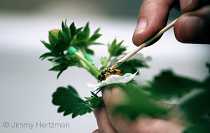Assessing the risk of stigma clogging in strawberry flowers due to pollinator sharing with oilseed rape
DOI:
https://doi.org/10.26786/1920-7603(2017)439Abstract
Strawberry and oilseed rape are economically important and co-flowering insect-pollinated crops that may affect each other via shared pollinators. One potential negative effect of pollinator sharing is stigma clogging, i.e. that pollen from one plant species covers the stigma and prevents pollination in the other. We tested if application of oilseed rape pollen on strawberry receptacles reduces pollination with subsequent effects on strawberry weight, number of malformations and ripening time. We simulated real pollination situations by using dead bees mounted on toothpicks to mimic flower-visitation of foraging bees. Six strawberry flowers, usually on different plant individuals, were hand-pollinated sequentially per simulated foraging bout. In half of these foraging bouts, we started with an oilseed rape flower, and in those foraging bouts the proportion oilseed rape pollen was expected to decline with increasing number of visited strawberry flowers. Oilseed rape pollen had no effect on any of the tested variables. Increasing number of previously visited strawberry flowers in the simulated foraging bout enhanced the number of developed achenes, but this was marginally non-significant when accounting for the total number of achenes. Strawberry weight increased and ripening time decreased with increasing number of pollinated achenes, whereas none of the tested factors had any effect on the number of malformations. Our results have implications for strawberry farmers, because shortened ripening time could reduce the risk of yield loss from pests, diseases and unfavourable weather conditions. In addition, we show that oilseed rape pollen is unlikely to disturb pollination success of strawberry flowers.

Downloads
Published
How to Cite
Issue
Section
License
Copyright (c) 2017 Lina Herbertsson, Ida Gåvertsson, Björn K Klatt, Henrik G Smith

This work is licensed under a Creative Commons Attribution 4.0 International License.











